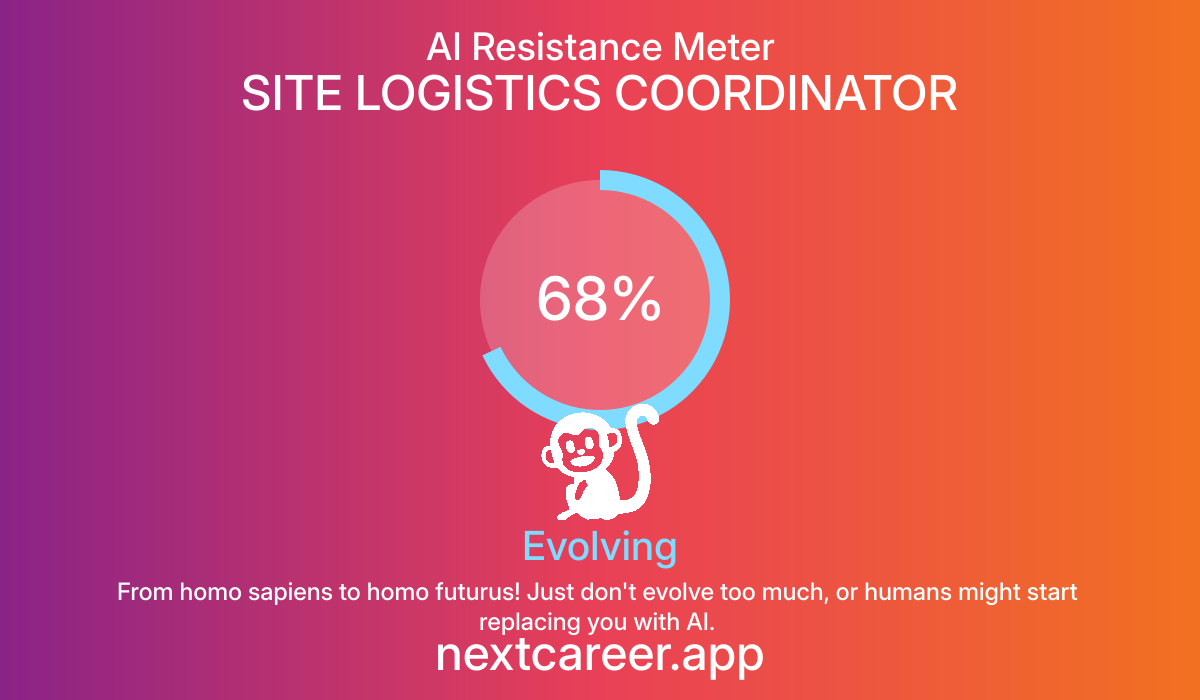AI Resistance Analysis
SITE LOGISTICS COORDINATOR
SITE LOGISTICS COORDINATOR
AI Resistance Score
AI Resistance Meter
Evolving
SITE LOGISTICS COORDINATOR
You're upgrading faster than a computer from the 90s! Just remember, even flip phones thought they were the pinnacle of evolution once.
The role of a Site Logistics Coordinator involves managing and optimizing the flow of materials and equipment on a construction or project site. This job requires a mix of organizational skills, cognitive problem-solving abilities, emotional intelligence for team collaboration, and familiarity with physical logistics. While AI can assist in data management, scheduling, and inventory control, the necessity of human oversight, decision-making in dynamic environments, and interpersonal interactions contribute to its resistance against AI replacement.
The role of a Site Logistics Coordinator involves managing and optimizing the flow of materials and equipment on a construction or project site. This job requires a mix of organizational skills, cognitive problem-solving abilities, emotional intelligence for team collaboration, and familiarity with physical logistics. While AI can assist in data management, scheduling, and inventory control, the necessity of human oversight, decision-making in dynamic environments, and interpersonal interactions contribute to its resistance against AI replacement.
Key Factors
- Cognitive Tasks: AI can automate scheduling, inventory tracking, and logistical optimization, which reduces the need for human cognitive labor.
- Emotional Intelligence: Understanding team dynamics, managing conflicts, and negotiating with vendors require emotional intelligence, a skill that AI currently lacks.
- Physical Skills: Physical presence on site is necessary for overseeing operations, but AI tools can assist in monitoring these aspects.
- Creative Thinking: Problem-solving in unexpected situations requires innovative solutions, an area where humans excel compared to AI.
Human Advantages
- Ability to navigate interpersonal relationships and conflicts on-site effectively.
- Adaptability to unforeseen challenges, requiring real-time adjustments in logistics.
- Intuition built upon years of experience in the industry, which AI cannot replicate.
AI Vulnerabilities
- Increased integration of AI logistics software could reduce the need for traditional coordinators.
- Real-time data analytics and predictive modeling might streamline decision-making processes.
- AI-driven tools could manage inventory and resource allocation with minimal human input.
Recommended Actions
- Invest in AI literacy and training to enable seamless collaboration between humans and AI.
- Focus on building emotional intelligence and soft skills to enhance interpersonal effectiveness.
- Continuously adapt and incorporate new technologies into workflows to remain competitive and relevant in the industry.
In the near-term (5 years), AI tools will likely supplement the role of Site Logistics Coordinators, making routine tasks more efficient but not fully replacing the job. In the longer-term (20+ years), as AI evolves, more complex decision-making tasks could be managed by AI, yet human supervision will remain crucial due to the unpredictable nature of on-site logistics. The role may shift towards a more supervisory and strategic position, focusing on managing AI tools rather than executing tasks directly.

Why Calculate AI Resistance?
Understanding how AI-resistant your career is becoming increasingly important in today's rapidly evolving job market. Our analysis combines multiple factors including required human skills, technological adaptability, and future industry projections to give you a comprehensive view of your career's sustainability.